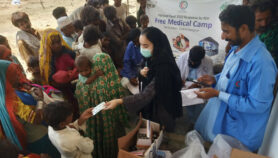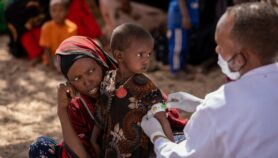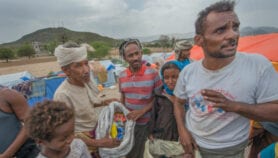By: Joel Winston
Send to a friend
The details you provide on this page will not be used to send unsolicited email, and will not be sold to a 3rd party. See privacy policy.
The lack of research on links between disability and poverty could jeopardise countries' progress in achieving the Millennium Development Goals (MDGs), according to one of the authors of a major international study into disability in Africa.
Research on this issue in developing countries tends to focus on disability prevalence, detracting attention from studying the mechanisms that keep disabled people living in poverty, says Arne Henning Eide, chief scientist at the Foundation for Scientific and Industrial Research (SINTEF) in Norway.
SPEED READ
- Past studies look at prevalence, not poverty links
- EU study in four African countries makes case for separate policy category
- Research is often hindered by definitions of 'disability'
"The lack of a disability perspective and combining mainstreaming with targeted strategies increases the chances of individuals with disabilities being left behind in efforts to reach the MDGs," he tells SciDev.Net.
Eide was one of the researchers on EquitAble, a study of disability in Malawi, Namibia, South Africa and Sudan, involving researchers from universities across these countries as well as from Ireland and Norway. The EU provided €3 million (US$4 million) for the study, which included household surveys and policy analysis.
Previous SINTEF research in Africa suggested that there was a widespread and systematic discrimination against disabled people and other vulnerable groups.
EquitAble's new findings, due to be published shortly in the African Journal on Disability, highlight the lack of a disability perspective in the African Union's policies.
These policies treat disabled people as part of a generalised 'vulnerable group', failing to appreciate the different needs of the constituent groups.
The needs of a person vulnerable because they live far from a health facility are not the same as those, for example, of a deaf person attending a clinic, the paper says. The first requires adequate transport, while the second needs an accessible form of communication, such as sign language.
Global awareness of disability issues, and access to related scientific information, is generally poor, according to the WHO. [1]
Other studies have warned that insufficient attention is paid to issues such as the impact of HIV/AIDS on disabled groups. [2]
Yet, research has also been hindered by unclear and contested definitions of disability, which makes it harder to develop comparable research methods that can be used globally, says Eide.
Also, an increasing acceptance that disability is a social as well as a medical phenomenon makes it even harder to study, he says.
"There's a more complex mechanism behind the relationship," Eide says. "Disability or vulnerability interacts with other factors that you have to take into consideration, for example education and social class."
Further projects focusing on living conditions among disabled groups in developing countries — including Angola, Botswana and Nepal — are already planned or underway, some by the same researchers who were involved with EquitAble.
Daniel Mont, principal research associate in epidemiology and public health at University College London, United Kingdom, says that SINTEF's research is important because research into poverty and disability has "not received the attention it deserves".
"Until recently, data to even look into this issue in depth have not been available," he tells SciDev.Net. "Only in the last five to ten years have decent measures of disability been paired with poverty data in a way that the relationship can be properly explored."
Another upcoming paper by Eide suggests that integrating a disability perspective into international aid organisations' work could strengthen their impact on reducing poverty among disabled people.
References
[1] World Report on Disability (WHO, 2011)













